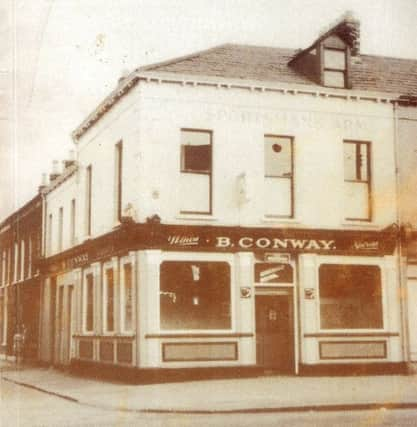Roamer: Bard of the rings penned a ballad for boxing buffs to boost better fellowship


With the whole world mourning the passing of Muhammad Ali, the iconic boxer’s Louisville funeral on Friday will probably be history’s most memorable ‘boxing day’.
Many folk in Ireland, north and south, will grieve with Ali’s fans around the globe - he was very proud of his Irish ancestry - and some old, dock-land drinking-mates in Belfast will probably pull a faded newspaper cutting from their wallets and fondly recall times past.
Advertisement
Hide AdAdvertisement
Hide AdThe much-published Belfast author and poet John Campbell is a sailor town man through and through, and frankly, until I read the poem that he’s sharing here today, I didn’t realise that boxing was - and still is - so very deeply rooted in our culture and heritage.
“I wrote my poem about the heavyweight division in 1982,” John’s e-mail continued “to record the various heavyweight champions who won the title using gloves.”
It’s a vivid and colourful history of boxing in nine verses containing wonderful nicknames…and not a few ancestral surnames from the Emerald Isle!
Too many historic bouts and knock-outs are mentioned in the poem to include here in full, and Roamer has added just some explanations and clarifications for those of us who aren’t fluent with the sport’s unique heritage and distinctive vernacular!
Advertisement
Hide AdAdvertisement
Hide Ad“We drank in a bar in York Street called Barney Conway’s,” John recounted in his e-mail, adding “the talk was always of boxing and there was constant controversy that sometimes led to frayed tempers and flying fists!”
Barney’s bar, which features on the cover of John’s book ‘Memories of York Street’, was knocked down in the 1970s but the heated debates about dates and championship titles continued in nearby hostelries.
“There was one thing that we all agreed on,” John noted - “Muhammed Ali was the best heavyweight champion the world has ever seen!”
In 1982 John decided to “check the heavyweight records and put them to rhyme, in order to have a reference that we could refer to in order to stop the physical confrontations!”
Advertisement
Hide AdAdvertisement
Hide AdHis ‘Ballad for Boxing Buffs’, subtitled a ‘Tribute to the Greatest’, was published in the now defunct newspaper known as The Ulster, or Ireland’s Saturday Night, “and some of the lads cut out the poem and carried it in their pockets for quick reference,” he explained. Roamer has added some notes after John’s first verse illustrating the intriguing history hidden between his lines.
“Sullivan in 1892,
Was the first gloved champion the division knew.
Corbett, matched in a title bout,
Took twenty one rounds to knock ‘The Strong-Boy’ out.
Fitzsimmons, on a St Patrick’s Day,
Needed twelve to put ‘The Gent’ away -
Paralysed him where he put his lunch
And immortalised the solar-plexus punch.”
John Lawrence Sullivan (1858 -1918), also known as the Boston Strong-Boy, was an American boxer recognized as the first Heavyweight Champion of gloved boxing, holding the title from 1882 to 1892.
His parents were Irish immigrants.
James John ‘Gentleman Jim’ Corbett (1866 - 1933) was the son of Patrick Corbett, an émigré from County Mayo to America.
In 1894 James returned to Ireland and among the highlights of his celebrity tour were the boxing demonstrations he gave in Ballinrobe, where his uncle was the parish priest.
Advertisement
Hide AdAdvertisement
Hide AdRobert James ‘Bob’ Fitzsimmons (1863 - 1917) was a British-New Zealand champion boxer who made boxing history by beating Corbett, the man who beat Sullivan!
His father was James Fitzsimmons from County Armagh.
Each verse of John’s poem is packed with boxing history, ending with The Greatest - the outspoken Louiseville Lip, the Rumble in the Jungle, the Thrilla in Manila - Muhammad Ali, whose great-grandfather, Abe Grady from Ennis, emigrated from County Clare to the United States in the 1860s.
“Jeffries, renowned for heavy hittin’,
Fought eleven rounds to beat the ageing Briton.
‘The Boiler-Maker’ then retired,
And a fight between Hart and Root transpired.
Hart took the title, but didn’t rate
With a Tommy Burns, boxing underweight.
Johnston hunted Tommy down
And police stopped the fight in the fourteenth round.”
Several more verses recall the victories and defeats down the years of boxers like The Black Prince who “let himself go to pot”; Jess Willard “who was matched with ‘The Manassa Mauler’” and Jack Dempsey’s reign “was long and sunny, ’til he met a fighting marine called Tunney.”
Poignantly, Sonny Liston entered to the ring to face Cassius Marcellus Clay in the penultimate verse of John’s poem:
“But Sonny, unsettled by Clay’s lightning flicks,
Stayed on his stool at the end of Round six.
Clay became Ali, and conquered the field,
Not one among them could make the champ yield.
His title was forfeited outside the ring,
And ‘Smokin’ Joe Frazier proclaimed himself King.
George Foreman, built like a railway train,
Quickly ended the pretender’s reign.”
“Enter Ali and his ‘Rope-a-dope’
Which left the Colossus without a hope.
He took the title for a second time,
When he lost it to Spinks, he was past his prime.
But ‘The Greatest’ proved he was that and more,
When he did what had never been done before.
Once again he became world King,
When he finally went, boxing lost its zing.”
John Campbell’s poem, written in 1982, closes with a prophetic tribute.
“So here I’ll end my nostalgic trip,
For there won’t be another like ‘The Louisville Lip’”